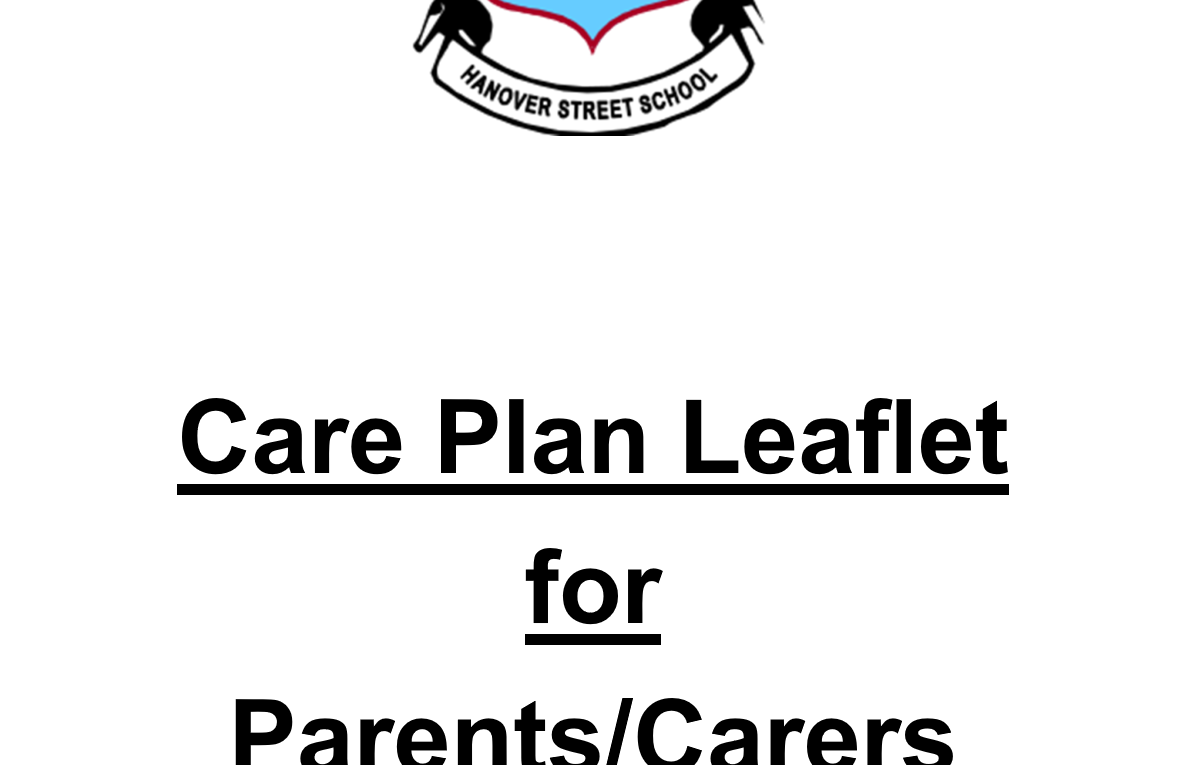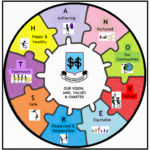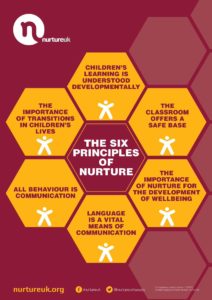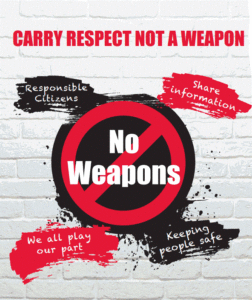Care Plan Leaflet – September 2022 – Translatable Link
What is a Care Plan – Leaflet for Parents – September 2022
Care Plan Leaflet
for
Parents/Carers
(updated September 2022)
*Translatable link:
A Nurturing Approach
Hanover Street School aims to be nurturing in its approach.
We respect that every child has different experiences of play and childcare and therefore form relationships in different ways, and separate with different levels of confidence. We also respect that every family has had different experiences of education.
Settling into nursery is very different for each child and family, and their needs are considered on an individual basis.
How will we make the above happen?
✔ Regular informal/day-to-day sharing of information
✔ Stay and play sessions
✔ Sharing of news and events via newsletters, other letters, meetings, website, etc.
✔ One-to-one care plan meetings between parents and Key Workers
What is a care plan?
In accordance with the Social Care and Social Work Improvement Scotland (also known as the Care Inspectorate) Regulations 2011, care plans (or personal plans) are a requirement for Early Learning and Childcare Providers.
A care plan is a simple document, created by the school, and completed together with the parent and the family’s Key Worker. It gathers useful information about the child and family, in order to support wellbeing, learning and development, enabling us to best meet families’ needs.
What can I expect in a care plan meeting?
Care plan meetings are basically a “getting to know you” and “information gathering” meeting, for your child and family. We will consider the “wellbeing” of your child, or simply, how things are going for them. We will ask questions to find out where your child’s strengths lie and also, if there are any concerns, to see where some advice, help or support might be needed. This discussion will be supported by informal questions, framed around 8 categories:
★ Safe
★ Healthy
★ Achieving
★ Nurtured
★ Active
★ Respected
★ Responsible
★ Included
These categories or, wellbeing words, are often known as the SHANARRI indicators and are illustrated in the SHANARRI wheel, which is on the cover of this leaflet.
They come from the Scottish Government-led approach called GIRFEC. It stands for ‘Getting It Right For Every Child’. It is based on the United Nations Convention for Rights of the Child (UNCRC) and aims to make sure that our children and young people – and their parents or carers – can get all the help and support they need from birth right through to age 18.
The wellbeing of children and young people is at the heart of the GIRFEC approach. Without good wellbeing, a child will not achieve their full potential.
Why do we ask for this information?
Some of the information we ask for you to share is personal. Please don’t feel uncomfortable with this. We treat the information with respect and confidentiality. These questions are for your child’s benefit – strong health and wellbeing is the foundation for good play, better learning and achievement.
What will you need to bring with you?
Please bring with you:
- Details of your GP Practice – address, phone number, etc
- Name of your Health Visitor
- Immunisations record (in your red book)
- Dentist details
When will the care plan be created?
Regulations state that we must prepare this written plan within 28 days of children starting using the service (our nursery).
How often will the care plan be reviewed?
We aim to review care plans 3 times each school year; the minimum requirement being twice a year. We will also review the plan when requested to do so by the family, or when there is a significant change in a pupil/family’s health, welfare or safety needs.
How are the care plan and its information stored?
We file these care plans safely in nursery. You can ask to view your care plan at any time.
What happens after the care plan meeting?
Your key worker may share only relevant information with the nursery team, enabling them all to support your child. If there are support needs for your child, an action plan may be drawn up to promote consistency of approach within the team.
Thank you for taking time to read this leaflet.
We hope it answered any questions/concerns regarding the care plan.
The Six Principles of Nurture and the Key Worker System
There are 6 principles of nurture (Lucas,S., Insley,K. and Buckland,G. (2006)), and how we realise these at Hanover Street Nursery is very much supported by the Key Worker System.
To promote and help embed the above principles, Hanover Street Nursery works a “Key Worker System”. Important parts of being a Key Worker are:
- to help your child settle at Hanover Street School Nursery;
- talk with parents about their child;
- keeping an extra special eye open to how your child is settling in at nursery;
- assisting your child to integrate into nursery if necessary;
- to provide emotional needs to your child, if required;
- to make sure, with carers and parents, that the child’s race, culture, religions, language and family values are being met;
- to observe, keep records and monitor the child’s progress and asking and encouraging parents to participate in their child’s development, further promoting it;
- to feedback information that might be important to parents or any worries the key person has come across;
- to continue to respect that the parent and child’s information is remaining confidential;
- to work in conjunction with parents in a professional manner, in line with Aberdeen City Council, and Scottish Social Services Council (S.S.S.C) Codes of Conduct.







